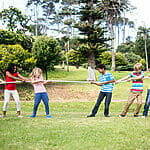Starting homeschooling mid-year can feel like jumping into a deep ocean without knowing how to swim. The idea of taking on the responsibility of educating our children can be overwhelming, especially for those who are new to the experience. However, I want to assure you that you are not alone in this journey. As a homeschooling parent myself, I understand the challenges that come with this decision, and I am here to offer you some guidance and support.
Let me tell you something, dear reader: homeschooling is not just about curriculum selection. It’s about something deeper and more profound. It’s about connection. Connection with family, friends, interests, community, natural and physical world, spiritual or philosophical underpinnings, and self. Connection is the heart of homeschooling, and it’s the foundation that will help your child thrive academically, socially, and emotionally.
In this article, I will explore why connection, not curriculum, should be your priority when starting mid-year homeschooling, and how taking the time to help your child reinforce or create connections will make homeschooling work more effectively in the future. So, let’s dive into this journey together, with compassion, support, and nurturing.
Key Takeaways
- Starting homeschooling mid-year can be daunting, but prioritizing connection over curriculum is key.
- Connection includes family, friends, interests, community, natural and physical world, spiritual or philosophical underpinnings, and self, and is more important than pre-planned and pre-packaged curriculum and resources.
- Deschooling is a process that allows a child to increase or recover a sense of connection, and helping a child with connection is more difficult than purchasing a curriculum, but ultimately more effective.
- Taking time to reinforce or create connection will make homeschooling work more effectively in the future, as connection, not curriculum, is the heart of homeschooling.
Homeschooling Challenges
I’m facing some homeschooling challenges, but after reading about prioritizing connection over curriculum, I realize that focusing on building connections with my child is more important than choosing the perfect curriculum.
The mid-year shift from traditional schooling to homeschooling has been overwhelming, but I’m finding comfort in connecting with other homeschooling families in my community. I’ve discovered a wealth of support resources such as online forums, local co-ops, and even homeschooling mentors who have been through similar experiences.
Through these connections, I’m learning that the most important part of homeschooling is fostering a strong relationship with my child. It’s not about finding the perfect curriculum or keeping up with traditional school standards.
It’s about creating a learning environment that nurtures my child’s natural curiosity and interests. I’m excited to continue building these connections and exploring new ways to support my child’s educational journey.
Importance of Connection
Truly connecting with our children is the heart of successful homeschooling, as it fosters receptivity, curiosity, respect, and healing within them. As parents, we must prioritize the connection we have with our children, both individually and within our community.
Here are four ways to incorporate connection into our homeschooling curriculum:
-
Prioritize self-care: Taking care of ourselves allows us to be more present and attentive to our children. By prioritizing our own well-being, we model the importance of self-care to our children, and they learn to do the same.
-
Build community: Homeschooling can be isolating, so it’s important to build connections with other families who are also homeschooling. This provides us with support, resources, and a sense of belonging.
-
Follow their interests: When we allow our children to explore their interests, we show them that we value their unique passions and abilities. This also allows them to take ownership of their learning, which fosters a sense of independence and self-motivation.
-
Emphasize relationships: Learning happens within the context of relationships, so it’s important to prioritize our relationships with our children. This means taking the time to listen to them, empathize with them, and create a nurturing and supportive environment for them to learn and grow in.
By prioritizing self and community, following our children’s interests, and emphasizing relationships, we can incorporate connection into our homeschooling curriculum. This not only enhances the feeling of safety and acceptance our children have, but it also creates a foundation for lifelong learning and personal growth.
How Do Homeschool College Admission Requirements Differ for Mid-Year Homeschooling?
Mid-year homeschooling affects homeschool college admission requirements differently. Admissions committees may evaluate applicants based on their homeschool portfolios, standardized test scores, and recommendations. However, the key difference lies in the timing. Mid-year homeschoolers may have alternative documentation methods and need to ensure they meet all the necessary criteria to be considered for college admissions.
Deschooling Process
Learning how to deschool my child has been a challenging but necessary process in our homeschooling journey. It’s not just about taking my child out of the traditional school system, but also about helping them unlearn the habits and beliefs they’ve picked up from it.
Deschooling is a process that allows my child to recover a sense of connection with themselves, their interests, and their learning style. It’s about giving them the freedom to explore and learn without the pressure of grades, tests, and deadlines.
One of the benefits of deschooling is that it allows my child to rediscover their natural curiosity and love for learning. Instead of being focused on what they should learn, they can focus on what they want to learn. This means that they can pursue their passions and interests, and learn at their own pace and in their own way.
Another strategy that’s worked for us is to incorporate real-life experiences into our homeschooling. Trips to museums, libraries, parks, and other places that spark my child’s interest have been invaluable.
Deschooling is not an easy process, but it’s an essential one for any homeschooling journey.













